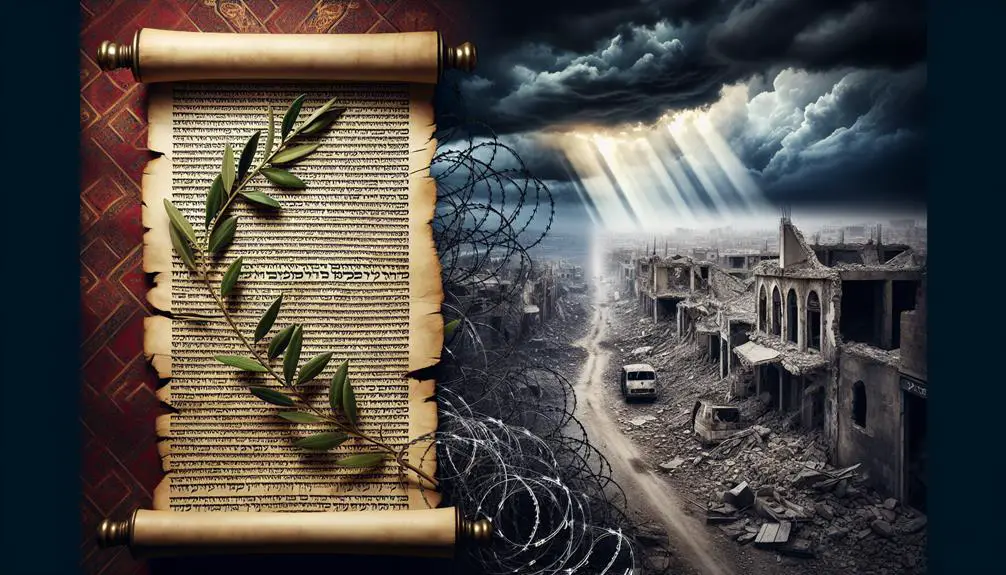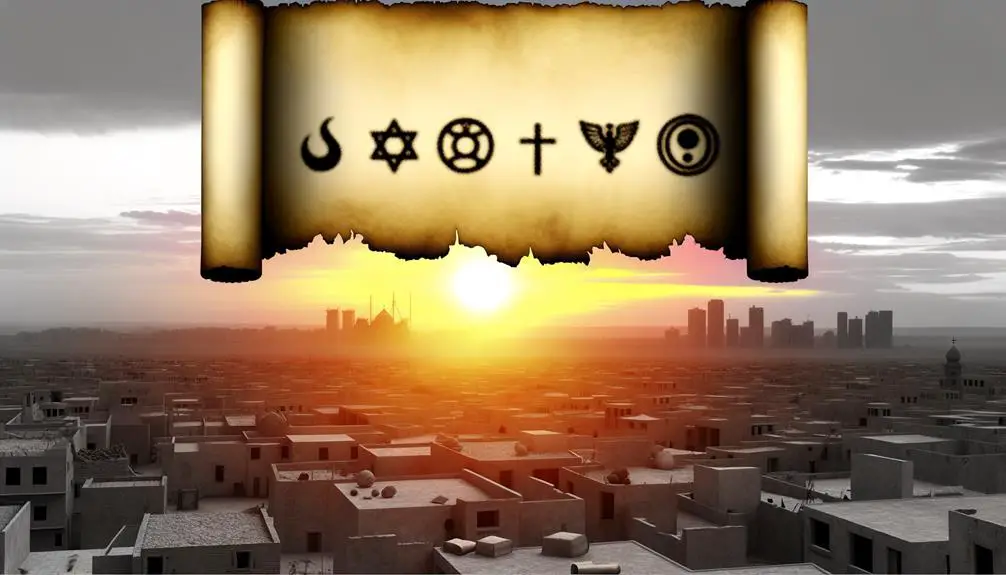Probing the parallels between ancient prophecies and Israel's current conflict, discover if history's echoes were scripted in the Bible.

Is This War in Israel in the Bible
As you're aware, history often repeats itself, and this adage might hold true when you explore the current conflict in Israel through the lens of biblical prophecies.
You've likely heard numerous interpretations, but distinguishing historical events from theological forecasts can be a complex endeavor.
By examining Biblical prophecies, historical wars documented in scripture, and juxtaposing them against modern conflicts, you'll gain a nuanced understanding of whether these events were foreseen.
While the answer isn't straightforward, the journey to uncover it could shed light on the accuracy of prophetic texts and their relevance to today's world, leaving you pondering the depth of ancient wisdom.
Key Takeaways
- The Bible contains prophecies that are interpreted to predict events and wars in Israel, including modern conflicts.
- Interpretations of these prophecies vary, with some seeing them as literal predictions and others as symbolic or allegorical.
- Applying ancient biblical prophecies to contemporary wars requires careful analysis to avoid misinterpretation due to symbolic language and historical context.
- There is no consensus among scholars on the fulfillment of specific prophecies, emphasizing the importance of contextual understanding.
Biblical Prophecies Explained

Throughout the Bible, numerous prophecies shed light on the tumultuous events and wars in Israel, offering a complex tapestry of historical and future predictions that demand meticulous analysis. You'll find that these prophecies, laden with prophetic symbolism and divine messages, serve not only as forewarnings but also as guides for understanding the spiritual and moral dimensions of conflict.
Delving into the prophetic symbolism, it becomes apparent that the Bible uses vivid imagery and metaphors to convey its divine messages. For example, the portrayal of nations as beasts in the books of Daniel and Revelation isn't merely for dramatic effect; it's a strategic use of symbolism to represent political powers and their roles in God's plan for humanity. These symbols, once decoded, provide you with insights into the nature of the conflicts foretold, suggesting that wars in Israel often symbolize broader spiritual battles between good and evil.
The divine messages embedded within these prophecies are multifaceted. They caution against straying from faith, predict the consequences of national actions, and ultimately, offer hope for redemption and peace. By analyzing these messages, you're invited to see beyond the immediate context of conflict, recognizing the overarching themes of justice, mercy, and divine sovereignty.
Historical Wars in Scripture

Several historical wars detailed in the Bible not only shaped the ancient landscape of Israel but also carry significant theological implications, inviting you to explore their deeper meanings. These conflicts, often depicted as struggles between good and evil or as fulfillments of divine promises, offer a rich tapestry for understanding the complexities of faith, morality, and divine intervention in human affairs.
- Canaanite Conquests: The Canaanite conquests, as narrated in the Book of Joshua, represent a pivotal moment in the history of Israel. These military campaigns were seen as divine acts, with God commanding the Israelites to conquer the land of Canaan. The narrative emphasizes themes of obedience, faith, and the fulfillment of God's promises to the patriarchs. The conquests aren't merely historical events but are imbued with deep theological significance, illustrating the concept of a chosen people and the establishment of a covenantal relationship with God.
- Philistine Skirmishes: The Philistine skirmishes, most famously including the battle between David and Goliath, underscore the ongoing struggle between the Israelites and their neighbors. These encounters are depicted not just as military conflicts but as contests of faith and demonstrations of divine favor. The victory of David over Goliath, in particular, serves as a metaphor for the triumph of faith and righteousness over seemingly insurmountable odds.
- The Battle of Jericho: The fall of Jericho is another seminal event, symbolizing God's power to deliver victory to His people. The miraculous collapse of the city's walls, following the Israelites' obedience to God's commands, reinforces themes of faith, divine intervention, and the importance of adhering to divine will.
These historical narratives offer profound insights into the nature of faith, the concept of divine justice, and the role of God in the vicissitudes of human history.
Modern Conflicts and Ancient Texts

In examining the interplay between ancient biblical narratives and modern conflicts, it's crucial to understand how these texts continue to shape perspectives and actions in contemporary geopolitical landscapes. Through textual analysis within the appropriate cultural context, you can discern the nuanced ways in which historical scriptures are invoked or interpreted in today's discussions and conflicts.
Aspect |
Ancient Texts |
Modern Conflicts |
|---|---|---|
Influence |
Guiding principles |
Justification |
Interpretation |
Literal vs. Symbolic |
Political agendas |
Context |
Historical setting |
Contemporary issues |
Application |
Moral lessons |
Strategic decisions |
You'll notice that the influence of ancient texts often serves as a foundational layer upon which modern conflicts are justified, with both sides possibly claiming historical or divine right. Interpretation plays a pivotal role, where textual analysis becomes a tool for supporting various political agendas, often detached from the original cultural context. This detachment raises questions about the authenticity and relevance of such interpretations.
Understanding the historical setting of these texts and their intended lessons provides a clearer picture of the complexities involved in applying these ancient narratives to contemporary issues. It's not merely about drawing parallels but also acknowledging the significant differences in cultural context and historical circumstances.
Theological Interpretations

Many theological interpretations of ancient biblical narratives significantly influence contemporary perspectives on conflicts involving Israel. You might find it intriguing how these interpretations vary, reflecting the diversity within religious communities. These theological perspectives often hinge on concepts of divine intervention and moral teachings, shaping believers' views on modern-day events in the region.
Here are three key aspects where theological interpretations intersect with contemporary conflicts:
- Divine Intervention: Many believers see current conflicts as manifestations of divine will, interpreting events as part of a larger, divine plan for humanity. This perspective may lead to viewing the state of Israel and its conflicts through a lens of prophetic fulfillment, where divine intervention plays a crucial role in the unfolding of historical events.
- Moral Teachings: The ancient texts offer a plethora of moral teachings, which some apply to the modern context of war and peace. The emphasis on justice, mercy, and reconciliation within these texts can inform a faith-based approach to conflict resolution, urging parties to seek peaceful solutions that are in line with ethical principles.
- Historical Covenant: The concept of a historical covenant between God and Israel is central to many theological interpretations. This covenant is seen as providing a divine mandate for the existence and actions of the state of Israel, influencing how contemporary events are perceived and evaluated.
In analyzing these theological interpretations, it's crucial to approach them with a scholarly and objective mindset, recognizing their complexity and the profound impact they've on individuals' understanding of and reactions to ongoing conflicts in Israel.
Evaluating Prophetic Accuracy

Understanding the theological interpretations of ancient narratives leads us naturally to examine the accuracy of biblical prophecies in the context of modern conflicts in Israel. You must recognize that the nature of these prophecies often embodies a rich tapestry of prophetic symbolism, which complicates straightforward interpretations. Scholars and theologians alike grapple with these texts, attempting to discern their relevance to contemporary events.
In evaluating prophetic accuracy, it's essential to consider the predictive challenges inherent in applying ancient scriptures to modern situations. Biblical prophecies were written in a context vastly different from today's geopolitical landscape. This discrepancy raises questions about the direct applicability of these prophecies to current events. You're dealing with texts that were often intended to address the immediate concerns of their original audience, while also projecting a vision of the future that's open to interpretation.
Furthermore, the symbolic language used in these prophecies adds another layer of complexity. You find that symbols and metaphors, which were deeply meaningful to ancient cultures, may not translate directly to our current understanding. This symbolic language requires careful analysis to avoid misinterpretation.
In your quest for understanding, it's also crucial to acknowledge the diversity of opinions among scholars. There's rarely a consensus on the specific fulfillment of prophecies due to the subjective nature of interpretation. As you explore these ancient texts, you learn to appreciate the blend of historical context, symbolic meaning, and the interpretive lens through which scholars view these passages.
Evaluating the accuracy of biblical prophecies in the light of modern conflicts in Israel demands a nuanced approach that respects the complexity of prophetic symbolism and the challenges of predictive interpretation.
Frequently Asked Questions
How Do Contemporary Religious Leaders Across Different Faiths View the Current Conflict in Israel in Relation to Biblical Prophecies?
You're looking at how contemporary religious leaders from various faiths interpret the current conflict in Israel, especially in light of biblical prophecies. They delve into historical context and engage in theological debates, analyzing scriptures to understand whether these events were foretold.
Their views vary widely, reflecting diverse interpretations and beliefs. This complexity shows the challenge in aligning modern-day conflicts with ancient prophecies, demonstrating a broad spectrum of opinions within and across religious communities.
Are There Any Psychological Impacts on Believers and Non-Believers Alike When Modern Wars Are Framed Within the Context of Ancient Biblical Prophecies?
When modern wars are interpreted through the lens of ancient prophecies, you're navigating a complex psychological landscape. This framing can challenge historical accuracy, creating cognitive dissonance.
You, whether believer or non-believer, might face impacts on your emotional resilience. The struggle to reconcile contemporary conflicts with age-old narratives can lead to heightened anxiety or a sense of fatalism, affecting your psychological well-being and perspective on global events in a profound way.
How Do Educational Institutions Incorporate or Address the Topic of Modern Conflicts in Israel and Their Potential Biblical Connections in Their Curriculum?
As you delve into curriculum development, you'll find that educational policies vary widely. Some institutions may choose to explore modern conflicts in Israel through a historical lens, carefully avoiding or critically examining potential biblical connections.
Others might integrate these discussions into religious or cultural studies, fostering a nuanced understanding of the complexities involved.
It's crucial to analyze how these educational choices reflect broader societal attitudes towards history, religion, and conflict resolution.
What Role Do Social Media and Digital Platforms Play in Shaping Public Opinion on the Correlation Between Biblical Prophecies and Current Conflicts in Israel?
Ever wondered how your views are shaped online?
Social media and digital platforms play a pivotal role in framing public opinion on global conflicts. They're arenas where digital literacy and propaganda analysis become crucial.
Through posts, videos, and discussions, they can either enlighten or mislead you about the significance of current events.
It's about sifting through information critically, understanding the narratives, and recognizing the power of digital influence in interpreting modern conflicts.
How Have Interpretations of Biblical Prophecies Influenced Diplomatic Relations and Peace-Keeping Efforts in the Middle East?
Interpretations of biblical prophecies have deeply influenced diplomatic relations and peace-keeping efforts in the Middle East.
You'll find that historical accuracy and prophecy validation play crucial roles in shaping these interpretations.
They often serve as a double-edged sword, inspiring hope for some while fueling conflict for others.
As a result, they're integral in understanding the complex dynamics at play in the region's ongoing quest for peace and stability.
Conclusion
In conclusion, deciphering modern conflicts through the prism of biblical prophecies is akin to navigating a vast ocean using ancient stars; it requires both knowledge of the texts and understanding of current events.
While historical and theological analysis may offer insights, the accuracy of mapping contemporary wars onto scriptural predictions remains complex.
Just as sailors once relied on celestial navigation, scholars and believers look to these ancient texts, navigating the murky waters of interpretation and faith with cautious optimism.



Sign up